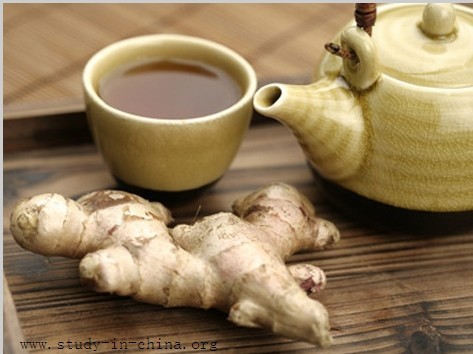more>>More News
- National Day
- ways to integrate into Chinese style life
- Should they be in the same university with me?!!
- Chinese Ping Pang Legend: the Sun Will Never Set
- A Glance of those Funny University Associations
- mahjong----The game of a brand new sexy
- Magpie Festival
- Park Shares Zongzi for Dragon Boat Festival
- Yue Fei —— Great Hero
- Mei Lanfang——Master of Peking Opera
Ginger Gets to Root of summer ills
By admin on 2015-02-03

Ginger tea helps dispel pathogenic cold and is
recommended for those working in cool air-conditioned rooms.
GINGER is a
warm-energy herb and is especially helpful in summer to treat conditions caused
by spending too much time in air-conditioned rooms.
Eating turnip in
winter and ginger in summer to keep the doctor away - that's the traditional
Chinese medicine version of "an apple a day" in the West. The saying is widely
known and has been passed down through generations.
While ginger has
myriad uses all year round and many people wisely eat a few thin slices a day,
it is especially useful in summer.
Ginger is a powerful antioxidant and
it is famous around the world for soothing the stomach, fighting inflammation,
stimulating circulation, thinning the blood, reducing spasms and cramps, easing
joint pain and fighting internal infection and external sores.
The
spicy, fragrant ginger root is classified as a yang (hot energy) herb in TCM and
can relieve summer discomforts and problems caused by what TCM calls
"pathogenic" cold and bacteria. These include indigestion, loss of appetite,
lack of energy and conditions related to spending hours in air-conditioned rooms
in summer.
Adding a few thin slices to food usually improves the
digestive system and increases appetite. A small cup of ginger tea can help
refresh the mind.
Spending time in air-conditioned rooms and drinking
icy beverages are common in summer, but a cool environment, inside and out, also
provides opportunities of pathogenic cold to invade the body.
In summer,
the yang energy in the universe is strong and the yin (cold energy) is weak,
making people vulnerable to ailments related to cold, according to traditional
Chinese medicine.
As pores open in the heat, cold energy enters the
body, causing common problems like the common cold and aching joints. Too much
iced foods and beverages aggravate the energy imbalance inside the body, causing
problems for the stomach and spleen, such as diarrhea and indigestion.
Ginger, as a warm herb, helps warm the body, promote sweating and
relieve indigestion due to pathogenic cold, according to Dr Xia Xiang, vice
president of Shanghai Dietary Therapy Society. Gingerols (related compounds),
curcumin (also in turmuric) and capsaicum (also in chili peppers) are major
active ingredients.
"Many people may feel hot after eating ginger and
sweat more due to accelerated blood circulation. As pores open wider, pathogenic
energies can be expelled together with the sweat, which helps rebuild the
balance in the body," says Dr Xia.
A strong ginger solution can be
applied externally to relieve joint aches caused by pathogenic cold.
Apart from expelling "cold" invasion, ginger can also help defend the
body against bacteria since it has antimicrobial properties. Because bacteria
reproduce quickly in summer, acute stomach or intestine inflammation is a
problem for many people.
Eating some ginger or drinking ginger tea has
an antibiotic effect and helps kill salmonella. Serving ginger with seafood is a
common practice in China and Japan.
Gargling with a ginger solution can
also help relieve bad breath and gum inflammation.
Despite its many
benefits, ginger is not for everyone.
"Ginger helps people bothered by
pathogenic cold problems, but it can aggravate problems due to pathogenic heat,"
says Dr Xia.
People with high blood pressure, diabetes, inflammation of
lungs, kidneys or gallbladder should be very cautious when eating ginger.
And no one should eat too much. A few slices - around 10 grams - a day
are usually enough in summer, says Dr Xia. Otherwise, people can sweat too much,
feel frequent thirst or get a sore throat.
The peel of ginger is "cool"
in property (yin energy) that can partially neutralize the "warm" ginger itself.
Retaining the peel helps reduce "hot" side effects of ginger.
But those
who have too much internal cold (yin), are advised to eat ginger without the
peel. It is recommended to serve peeled ginger with "cold" dishes such as bitter
cucumber and crabs.
Ginger tea
Add boiling water to a cup
containing a few slices of ginger.
Drink when it cools a little.
Benefits: Helps dispel pathogenic cold. Recommended for those working in
cool air-conditioned rooms.
Ginger solution for joint pain (external
application)
Make strong ginger soup, add a little salt and vinegar.
Soak a towel in the solution, wring and apply to painful joints.
Benefits: Relieves joint pain caused by pathogenic cold and activates
blood circulation.
Ginger and brown sugar soup
Make soup with
chopped ginger, sweeten with brown sugar.
Drink while relatively hot.
Benefits: Helps dispel pathogenic cold and relieve symptoms of common
cold and indigestion (vomiting and diarrhea). Helps relieve painful
menstruation. Women working with AC offices can drink a cup a day if they
frequently feel cold.
- Contact Us
-
Tel:
0086-571-88165708
0086-571-88165512E-mail:
admission@cuecc.com
- About Us
- Who We Are What we do Why CUECC How to Apply
- Address
- Study in China TESOL in China
Hangzhou Jiaoyu Science and Technology Co.LTD.
Copyright 2003-2024, All rights reserved




 Chinese
Chinese
 English
English
 Korean
Korean
 Japanese
Japanese
 French
French
 Russian
Russian
 Vietnamese
Vietnamese
